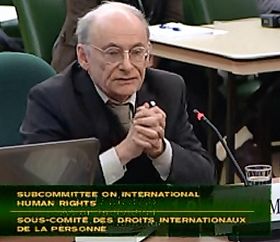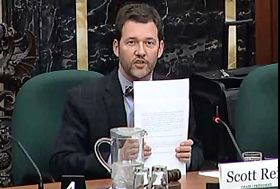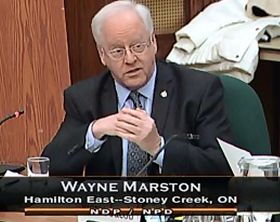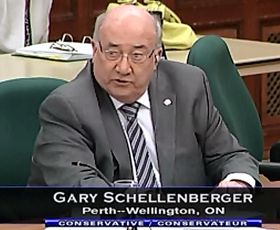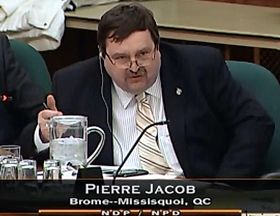(Minghui.org) The Canadian Subcommittee on International Human Rights of the Standing Committee on Foreign Affairs and International Development held a hearing on Parliament Hill on February 5, 2013, concerning the Chinese Communist Party's (CCP) organ harvesting from living Falun Gong practitioners.
Renowned Canadian human right lawyer David Matas
David Kilgour, former Canadian Secretary of State (Asia Pacific region) and former senior MP
Renowned Canadian human right lawyer David Matas and David Kilgour, former Canadian Secretary of State (Asia Pacific region) and former senior MP, gave a report of their investigation of the CCP's organ harvesting from living Falun Gong practitioners and answered questions from the committee regarding Falun Gong as a practice and the persecution of Falun Gong. They also made suggestions to the international community for ending the heinous crime of organ harvesting.
MP Scott Reid, Chair of the Subcommittee on International Human Rights
The hearing was hosted by MP Scott Reid, Chair of the Subcommittee on International Human Rights. Two Vice Chairs, MP Irwin Cotler and MP Wayne Marston, all committee members, two Members of Parliament who have been following the issue, assistants to MPs and parliament policy experts attended the hearing and heard overwhelming evidence provided by the witnesses.
MP David Sweet, member of the Subcommittee on International Human Rights
MP David Sweet started the question and answer session. He began: “I'm very grateful for Mr. Matas' and Mr. Kilgour's testimony. I have to say that I and my colleagues were charged with being level-headed and intellectually engaged on issues, etc., yet this issue seems to pull at even the most strident person's emotions, and it is almost unfathomable that this would go on.” He asked Mr. Matas and Mr. Kilgour to explain why their report “relied largely upon the making of logical inferences.”
Mr. Kilgour replied: “That Congressional Research Service paper happened in 2006, I think. In fact, our foreign affairs department put out a statement in the same week that our second report came out, but I think we have gone well beyond that, and I would hope that the Foreign Affairs Department here has more knowledge about the matter now.
“The Government of China doesn't even bother now to try to dispute the kind of thing Mr. Matas was saying. It has long ago given up the ghost. If you look on the embassy website, I'm quite sure you'll find a whole lot of propaganda against Falun Gong. It's been up for years, I believe, but no, Mr. Sweet, nobody disputes that this is happening. I was a prosecutor for 10 years. We have 52 kinds of evidence. If you don't like the first 10, go to the second 10. At some point most human beings, I think, will accept that maybe not all of the evidence is admissible in our courts, but the evidence that it's happening is overwhelming.
“The fact is that the UN and the U.S. Congress and everybody else is getting in on it now, and I frankly wish you had this hearing six years ago. I think the argument is over; now we have to get them to stop it. Mr. Matas and I have been traveling around to 50 countries or more.”
Mr. Matas said: “In terms of that congressional record, there are a few things I would say. One is that you have a situation whereby, given the very nature of the facts, the victim is dead and the body is cremated. Nobody is going to come up and say, 'I was organ-harvested.' We're dealing with something that happened in an operating room, which is cleaned up afterward so you can't visit the crime scene. The documentary records are all Chinese documents, and they're not accessible. The hospital where the operation takes place is completely closed. There are no witnesses, just perpetrators and victims. Sometimes the patients have tried to get their family doctor in, but that's been refused. Of course, that's the situation we start with from the get-go.
“I would also say that it's not up to us to prove this happened, although I do believe we have done so; it's up to China to account for the source of its organs. The World Health Organization, of which China is a member, has as one of its principles transparency. It has traceability as another principle. China does not respect those principles. They will not release statistics on the death penalty, which they say is the source of all the organs. This point was raised at the universal periodic review three years ago. Canada asked China in the universal periodic review to release death penalty statistics; China said no. They wouldn't do it.
“In fact, what we've seen as we've produced evidence quoting from Chinese websites is that they have removed the evidence from their own websites, although we've archived everything. They're engaged in a continuing and increasing cover-up rather than in increasing transparency. After all this cover-up, criticizing us for using logical inferences is just not a sustainable argument.”
MP Wayne Marston, Vice Chair of the Subcommittee on International Human Rights
MP Wayne Marston, Vice Chair of Subcommittee on International Human Rights, said: “We've had trade agreements with a number of countries for which human rights have been pushed aside and parked inside agreements, which is very concerning to us. There is the new relationship between China and Nexen and the potential for that to open markets and to put more commercial pressure on governments to turn a blind eye to situations like this. I agree with you that with the UPR coming up, it's reasonable for this committee to recommend that this particular issue be raised with the Chinese. That's what this whole idea of a UN periodic review is all about.” His question was whether the witnesses were still satisfied with the conclusions that they had reached in their report.
Mr. Matas replied, “Our research didn't stop in 2006. We did a second report in 2007. We did a third report in book form, Bloody Harvest, in 2009. We've done a fourth version last year. As we travel, we meet new witnesses and we hear new evidence; everything is reinforcing, nothing is contradicting. We have a whole chapter here on what Harry Wu said, which you're welcome to read.
“One of the principles we followed in doing our report is only relying on evidence that was independently verifiable, so if anybody actually wants to go through this themselves and come to their own conclusion on the material, they're free to do that and they can see everything that we saw. There are a number of people who actually have done that and produced corroborating reports, which we've produced—and some of them were quite long—in excerpt form in one of these chapters. There's a transplant surgeon in England, Dr. Tom Treasure, who wrote a corroborating report. There's an academic at the University of Minnesota, Kirk Allison”
Mr. Wayne Marston asked: “You've done a massive amount of work and a massive amount of traveling. How are you funded?”
Mr. Kilgour answered: “We work entirely as volunteers. I don't think anybody has ever paid us a cent for this. When we go someplace. Every trip is financed differently. The typical financing is that somebody who invites me may be a Falun Gong practitioner, and that person pays, or he and his friends pay. There is no organization with a budget that's pouring out money. It doesn't exist.
“I approached this issue as all of you did. When it first came to me, I didn't know what Falun Gong was or whether this was true or not and I slowly worked my way into it. One of the things I realized is that the Chinese government, the Communist Party, calls Falun Gong an organization, but it's not. It's a set of exercises with a spiritual foundation that anybody can do. They can start at any time, stop at any time, not join anything, do it on their own. Falun Gong are a group of individuals who in some cases have formed together to create ad hoc organizations here and there, but these organizations do not include everybody who does the practice.”
MP Nina Grewal, member of the Subcommittee on International Human Rights
MP Nina Grewal, member of the Subcommittee on International Human Rights, asked, “What can the Government of Canada do to encourage the adherence to human rights in China and judicial responsibility as well, specifically with regard to the over-representation of victims who are Falun Gong practitioners?”
Mr. Kilgour replied: “We saw what happened in Russia, where there was the long night before Mikhail Gorbachev became the general secretary. There are something like 150 demonstrations a year now across China, people protesting the fact that their farms have been seized or their homes have been bulldozed or something. David Matas and I have met wonderful people from China. The people of China want democracy and want the rule of law as much as you and I do, and it's going to happen.”
Mr. Matas added: “What you're asking is a strategic question to a certain extent, which this committee might be better placed to answer than we could, but I've tried to grapple with that myself. How do we deal with this particular issue, the killing of Falun Gong for their organs? There are different ways of dealing with it and dealing with human rights in China generally, including the persecution of Falun Gong and the labor camps.
“The most obvious way of stopping this immediately is stopping the killing of prisoners for organs, because once you stop the killing of prisoners for organs, you stop the killing of Falun Gong prisoners for organs. When you deal with some of these other issues, such as Falun Gong or human rights or labour camps or the death penalty, you get push-back, but when you tell the Chinese government to stop the killing of prisoners for organs, they will say we're right. If you give them time, they will do it. They will acknowledge that it's wrong and that it shouldn't be happening. It's a much different discourse, and it's a lot easier to deal with them on that issue.”
Mrs. Grewal asked: “On several occasions, it has been stated that prisoners in China have been arrested and detained without trial or appeal or any explanation. These detentions can be for days, even years, and they're a violation of their rights, of course. Is this a common occurrence for many other prisoners, or are the Falun Gong a systematically targeted population?”
Mr. Matas said: “You were asking about what's going on in forced labour camps. Of course, the Chinese government doesn't tell you that. They won't allow the Red Cross or anybody from outside into these camps. There's no reporting. There are no NGOs. They don't tell you where the camps are. They don't tell you what the populations are. The way we find out about the labour camps is we talk to people who've been in them and then get out of the camps and out of China. That's basically our only source of information. We can piece together a lot of information as a result, but we should again be insisting the camps be closed, that the Red Cross should get in, and that there should be transparency in the system.”
MP Irwin Cotler, Vice Chair of the Subcommittee on International Human Rights
MP Irwin Cotler, Vice Chair of Subcommittee on International Human Rights, began by commending Mr. David Matas and Mr. David Kilgour “for their pioneering and path-breaking work in regard to illegal organ harvesting.” MP Cotler said: “I've followed it for years and I think they are correct in characterizing the issue as one in which the evidence that they have adduced needs to be rebutted. The burden of truth at this point must be on the Chinese authorities. Until that rebuttal is forthcoming, then the case that has been put forward by David Matas and David Kilgour stands. I want to mention parenthetically that I am preparing a private member's bill along the lines that you have indicated and will consult with you so that we can put forward an exemplary private member's bill in that regard.”
MP Cotler asked a question about the CNOOC (China National Offshore Oil Corporation) taking over of Nexen (a Canadian oil and gas company based in Calgary, Alberta): “Apart from the overall concerns with a Chinese state enterprise taking over a Canadian resource company that had exemplary human rights standards, as you mentioned, Mr. Kilgour, there is the question of some serious allegations that the Chinese state enterprise, in this instance CNOOC, has itself been implicated in abuses of minority rights in China. In particular there is some evidence respecting the persecution of Falun Gong who were CNOOC employees and at the same time that CNOOC has used its security forces to cooperate with police in the arrest and detention of their own employees who were identified as Falun Gong practitioners. My question to both of you is whether you have knowledge and can speak to the evidence of the complicity of CNOOC in the abuse of Falun Gong.”
Mr. Matas answered: “There are 77 individual documented and verifiable testimonies of CNOOC complicity in the persecution of Falun Gong. CNOOC is a state company, and the Communist Party runs the Chinese government, including all state enterprises. It runs them centrally, regionally, and locally. Everywhere there's a government office or function, there's a Communist Party office or function that instructs the government office or function. There is a Communist Party office that instructs CNOOC. There is a part of the Communist Party that's responsible for the repression of Falun Gong. It is called the 610 Office, named after the date it was established: June 10, 1999. There is a 610 Office in the CNOOC affiliate in China, the Bohai Oil Corporation. That 610 Office was responsible, as I say, for the persecution of 77 documented individuals, who were interrogated, taken to the local police, arrested, detained, and sent to brainwashing centres or mental institutions. In mental institutions they, including pregnant women, were injected with nerve-damaging drugs.
“The employees who were Falun Gong were fined huge amounts, arbitrarily searched, and dismissed. Their pay was held and their possessions confiscated. They were denied benefits and bonuses. They were paid wages only at minimum cost, regardless of seniority of position, expertise, and education. If you were a Falun Gong practitioner or you are one today, employment in CNOOC in China is the first stop on a train whose final destination, potentially at least for some, is an unmarked white van where your organs are extracted and taken to the nearest hospital. Stops along the way are meetings with your immediate superior, then the Communist Party officials who run your office, then the local detention centre, then either a mental hospital or re-education through a labour camp.
“I myself met with people in Alberta who worked for CNOOC, were harassed by it, and managed to get out in time before they suffered the worst ravages, and they know some of these other people who have suffered a lot worse. I myself, as did David Kilgour, had reservations about this takeover of Nexen, and I thought preconditions for approval of the takeover should have been that all 610 Offices in CNOOC would have to be dismantled; that the company would have to admit openly, publicly, and in full detail its human rights violating past; and that the company would have to compensate fully all its victims for the harm that all the affiliates have inflicted. Now that the takeover has been approved, those conditions still need to be realized, as far as I'm concerned. I don't think we should say it's over and forget it. CNOOC is now a Canadian company, a Canadian neighbour, and we should insist that it respect these standards.”
MP Cotler said: “On the issue of net benefit, which has been the criterion regarding the determination of the takeover, would you say that human rights considerations effectively are not factored into the notion of net benefit and that it is purely an economic concern? When we're dealing with foreign investment approval guidelines, I would say also that the net benefit criteria, or whatever the criteria are, should include that if you're going to be approved for an investment in Canada, you have to respect human rights abroad, acknowledge past violation, and compensate the victims.”
MP Gary Ralph Schellenberger, member of the Subcommittee on International Human Rights
MP Gary Ralph Schellenberger, member of the Subcommittee on International Human Rights, first thanked the two witnesses for their knowledge and abilities to put forth all the work that they had done over the past number of years. He asked them, “Based on your research, have organ seizures from Falun Gong practitioners increased or decreased since your report was published?”
Mr. Kilgour said: “The short answer to that one is—and we agree on this completely—that the number of executions in China has actually gone down a little bit, thank goodness; however, while the number of transplants basically went down for a while in 2007, it's now gone up again. The result is that since the Falun Gong are the only other source of organs, the consequences for Falun Gong have been very negative. More Falun Gong are being killed for their organs than in the past.”
Mr. Schellenberger asked further if illegal global trade in human organs had improved or worsened over the past decade. Mr. Kilgour said: “I'm really not in any position to make a comment on that. However, let me give you the example of Australia. In 2006, Edward McMillan-Scott and I went to Australia. The Australian Broadcasting Corporation was extremely good. They put us on three nights in a row, and we talked about this situation. The Australians weren't aware of what was happening and where these organs were coming from when they went to China. About six months later we got an email saying that the number of Australians going to China for organs had...I think the term used was 'collapsed.' If Canadians or Australians or anybody else knows that when they go to First People's Hospital in Shanghai and check in for a kidney or a liver, somebody who has probably been convicted of nothing is going to die, I think most people would not do it. I know there is huge pressure on people to find the organs.”
Mr. Matas added: “Transplant tourism into China has definitely decreased since our report came out. In fact, it's not just Australia and other countries that have cut down on it; the Government of China itself has come out against it and said they are giving priority to Chinese nationals as opposed to foreigners. There is still transplant tourism into China. There is a website called Omar, which also appears in Arabic, that advertises transplants in China, but statistically there are definitely fewer. I would say that on the demand side, there is some a transition to a solution of the problem, but on the supply side, there is absolutely not. We're still getting organs sourced from the Falun Gong, and more so.”
Mr. Schellenberger asked: “I know that here in Canada, it's taken a long time for people to realize they can donate organs. It's been a long process. That process is happening in China, is it not? Is it because of their culture or their religion? I think we had that initially also. Do you think there is some hope that it will change down the road?”
Mr. Matas replied: “The Chinese government set up a donation process in 2010 as a pilot project. In the first year, I think they had 37 donations. There were more people working on donations than there were donations. The numbers picked up in the second year; I think there were 1,600. Of course, these are deceased donor donations. Not everybody dies as soon as they sign a card, so it doesn't actually lead to statistically significant numbers.
“People say it's cultural inhibitions, but I don't buy that. The Communist Party of China is culturally far more removed from the culture of China than the culture of organ donation is. Look at the tens of millions of people who have joined the Communist Party. I think what is really driving it is money and the marginalization of Falun Gong. A huge amount of money is paid to the hospitals and to the prisons. If you start getting donors, then the prisons don't get any money any more. I think that once the Communist Party gives this a priority—and frankly, pressing them on the human rights matter is going to push them in the direction of giving it a priority—they will get as many donors as they have members of the Communist Party, and then some.”
When asked whether the only way they finance their prisons is through organ, Mr. Matas answered: “It's not the only way, but in China the military is a business. The military, as a business, sells organs. It's not their only source of money, but it's a big source. In fact, there was a military hospital that had on its website, 'Selling organs is our main source of funds.' Like everything else, I quoted it, and they took it down.
“You might want to know that one of our inquiries was to go to three hospitals in Canada. This was about four or five years ago. We went to one in B.C., one in Calgary, and one in Toronto, and we asked them how many transplants had come from China, because people have to go for care afterwards. Just going from memory, we got the impression that about 100 Canadians had gone to China for organs. That was just in these three hospitals over the previous year or two. You can say it's a small number, but we'd like to think it would be zero. I think Canadians wouldn't be going if they knew what you know now. It's chilling, and there are many chilling incidents. As you say, somebody can survive a kidney donation, but we never came across a surviving kidney donor in China.”
MP Pierre Jacob, member of the Subcommittee on International Human Rights
MP Pierre Jacob, member of the Subcommittee on International Human Rights, asked the witnesses: “In recent years, the European Parliament, United States congressional subcommittees, the UN Special Rapporteurs on Freedom of Religion or Belief and on the Question of Torture, have raised concerns regarding allegations of organ harvesting of Falun Gong practitioners in China. How would you characterize the impact of international efforts to raise awareness regarding organ harvesting in China?”
Mr. Kilgour said that organizations like the World Health Organization has not shown much cooperation. He remained optimistic, but time was passing and every day, people were dying.
Mr. Matas added: “First of all, Manfred Nowak raised this issue a couple of times in his report, asking for China to explain the discrepancy between volume of transplants and volume of identified sources. That was picked up by the UN rapporteur on religious intolerance; Asma Jahangir repeated that. The Committee Against Torture, because China is a signatory to the convention against torture, asked China to appoint an independent investigation into sources of organs for transplants. The matter was raised in the universal periodic review.
“There was a petition within Europe with 166,000 signatures from 36 countries. I presented it in December to the UN High Commissioner for Human Rights. I met with them a couple of weeks ago. The petition was asking the UN to do an independent investigation. The official I met said that he would canvass the rapporteurs on health, torture, and religious intolerance in doing this.
“Obviously the international community could do more, but they're doing something. The European Union Parliament has held a couple of hearings on this issue, one of which I participated in during December, so there is some engagement. My view is that the universal periodic review is another opportunity to remind the international community of this issue.”
Mr. Jacob asked what should Canada and other like-minded governments do to increase transparency with respect to China's organ transplantation system.
Mr. Kilgour replied: “I have a very simple suggestion. We could indicate on the website of the Department of Foreign Affairs that if you go to China as a tourist for an organ transplant, it is possible that you will be receiving an organ that came from a Falun Gong member who is a slave in a labour camp. I am certain that the Chinese Embassy would not appreciate that type of measure. However, up till now, I do not believe that any government has posted such a notice on its website.”
Mr. Matas made a couple of suggestions. “One is to continue to press for China to release death penalty statistics. Second, China runs four transplant registries whose statistics are reasonably reliable, because the hospitals report directly to the registries. They are in four different cities in China. One is in Hong Kong. The Hong Kong liver transplant registry used to be public; then I started quoting their figures, and they shut it down. I would just say to China, make all data – obviously, not the individual data, but the aggregate – available from these four transplant registries. If you have that, and the death penalty statistics, I think you'd have a lot more transparency.”
Mr. Reid, the Chair of the subcommittee, said: “I can't remember if it was Mr. Kilgour or Mr. Matas, made a comparison briefly to Dr. Mengele, and when I look at what happened with the Nazis and what separated out the monstrous regime they had from run-of-the-mill persecutions that have occurred elsewhere through history, what strikes me is not that the people who perpetrated it were more evil but that the apparatus of persecution became self-financing and was no longer a drain on the state. Persecution is an economically inefficient activity. Taking productive citizens and persecuting them is economically inefficient, but when you can make it self-financing, as it then was, there's no limit on what it can do. The worry I have is that we have a self-financing apparatus for the persecution of a part of society. That's not its objective, but that is where it gets its raw material from, and it now has an incentive to keep itself going. Am I out on a limb here, or does that seem like a genuine problem?”
Mr. Kilgour replied: “The human body, last time I looked, under this system with the prices they have for the different organs, is worth about half a million dollars in China. Every Falun Gong practitioner or convicted prisoner is worth half a million dollars, because they take all the organs—they don't just take one—and then they burn the body. I think there's a huge waste, because you have to find people within a couple of days for the heart and so on. I'm sure there's enormous waste, but—in theory, at least—every human being who's killed under this terrible crime against humanity is worth half a million dollars. As you said, that's a particularly distressing factor about this.”
Mr. Matas added: “Yes, it's half a million per body. If you look at it in terms of totals, the government of China occasionally coughs up totals of 10,000 a year, and that's like a billion dollars a year. It isn't just the money. The primary concern of the party in power is power, not money. If you can create enough concern internationally so that their political legitimacy becomes questioned because of what they're doing, they will back away from this, in spite of all the money. Obviously the money keeps it going, but the problem of money can be overcome if enough concerns are expressed about the human rights violations.”
Mr. Reid concluded the hearing with the following statement: “I thank both of our witnesses very much. You've been fantastically helpful to us. Every time you come back, you are better informed than you were before, and we are all very appreciative. Thank you very much.”
All content published on this website is copyrighted by Minghui.org. Minghui will produce compilations of its online content regularly and on special occasions.
Category: Organ Harvesting



